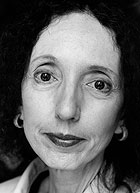Joyce Carol Oates, one of America’s most distinguished authors — three times nominated for the Nobel Prize in literature — will deliver the keynote address, “The Writer’s (Secret) Life: Woundedness, Rejection, and Inspiration,” as part of Washington University’s sixth annual faculty book colloquium “Celebrating Our Books, Recognizing Our Authors.”
The event is sponsored by the Center for the Humanities in Arts & Sciences and University Libraries and begins at 5 p.m. Monday, Dec. 3, in Holmes Lounge.

“Celebrating Our Books” honors the work of scholars from across the Arts & Sciences disciplines. Two WUSTL faculty members will make presentations, including Ahmet T. Karamustafa, Ph.D., professor of history, of religious studies and of Jewish, Islamic and Near Eastern studies, all in Arts & Sciences, who will speak on his book, “Sufism: The Formative Period” (2007); and Marina MacKay, Ph.D., assistant professor of English in Arts & Sciences, who will speak on her book, “Modernism and World War II” (2007).
In conjunction with “Celebrating Our Books,” the Campus Store will display volumes by colloquium participants that will be available for purchase. After the readings that night, authors will be available in the Campus Store to sign their works.
Oates began her prolific career in 1963 with the novel “By the North Gate.” In the years since, she has authored more than three dozen books, ranging from novels and short-story collections to plays, poetry, literary criticism and the book-length essay “On Boxing.” Author and literary commentator John Gardner has called her “one of the greatest writers of our time.”
Karamustafa’s “Sufism: The Formative Period” is a comprehensive historical overview of the formative period of Sufism, the major mystical tradition in Islam, from the ninth-12th centuries. Based on a fresh reading of primary sources and the integration of findings of recent scholarship on the subject, Karamustafa presents a unified narrative of Sufism’s historical development within an innovative analytical framework.
MacKay’s “Modernism and World War II” reconstructs the political and aesthetic contexts of midcentury writing by Virginia Woolf, T. S. Eliot, Rebecca West, Henry Green and Evelyn Waugh in order to describe how the war transformed literary modernism in England. In recovering how the writings of these major authors engaged other texts of their time — political discourses, mass and middlebrow culture — this study reveals how World War II brought to the surface the underlying politics of modernism’s aesthetic practices.
The colloquium is free and open to the public. For more information, call 935-5576 or e-mail cenhum@artsci.wustl.edu.